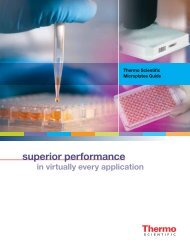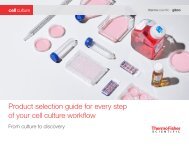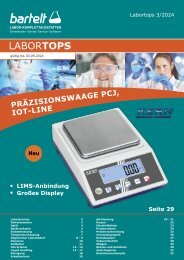PeloBiotech
Create successful ePaper yourself
Turn your PDF publications into a flip-book with our unique Google optimized e-Paper software.
www.pelobiotech.com<br />
IPSCs have been investigated for their use in dentistry, immunotherapy, and as a tool for personalized autologous body<br />
organ transplant, showcasing their expanding role in different medical fields (Hynes et al., 2015; Jiang et al., 2013; Palomo<br />
et al., 2014). Moreover, iPSCs have been utilized for modeling inherited cardiomyopathies, bone regeneration, and as a<br />
platform for drug screening and disease modeling, further emphasizing their broad applications in medicine (Karakikes et<br />
al., 2014; Tang et al., 2014; Hwang et al., 2021). The potential of iPSCs in regenerative medicine has also been recognized<br />
through the development of liver buds and clinical-grade neural stem cells, highlighting the ongoing efforts to harness<br />
iPSCs for clinical applicability (Sekine et al., 2020; Cai et al., 2021).<br />
We offer:<br />
• Around 10,000 human disease models for preclinical drug development<br />
• Diverse models, including spheroid and organoid models, physiological barrier models, and more.<br />
• An extensive selection of iPSC derivative cell types, from pericytes to cardiomyocytes, for a wide range of<br />
research applications<br />
Below is a summary of the cell types we provide. Please note that this list is not exhaustive. To explore our complete cell<br />
offerings, we encourage you to request our detailed cell list or visit pelobiotech.com for additional information.<br />
iPSC-Derived Cardiomyocytes (Heart):<br />
Cardiotoxicity screening for drug development.<br />
Studying heart diseases and genetic disorders.<br />
Regenerative medicine for cardiac tissue repair.<br />
iPSC-Derived Hepatocytes (Liver):<br />
Drug metabolism and toxicity testing.<br />
Modeling liver diseases and viral infections.<br />
Development of bioartificial liver devices.<br />
iPSC-Derived Hepatic Stellate Cells and Kupffer Cells (Liver):<br />
Investigating liver fibrosis and cirrhosis.<br />
Testing anti-fibrotic drugs for liver disease treatment.<br />
Understanding hepatic stellate cell biology.<br />
iPSC-Derived Neurons (Brain):<br />
Modeling neurodegenerative diseases like Alzheimer's<br />
Drug discovery and testing for neurological disorders.<br />
Studying neural development and function.<br />
iPSC-Derived Keratinocytes (Skin):<br />
Skin disease modeling, such as epidermolysis bullosa.<br />
Wound healing and tissue regeneration studies.<br />
Drug testing for dermatological conditions.<br />
iPSC-Derived Endothelial Cells:<br />
Investigating cardiovascular diseases and vascular disorders.<br />
Testing anti-angiogenic drugs for cancer therapy.<br />
Vascular tissue engineering and regenerative medicine.<br />
iPSC-Derived Kidney Cells:<br />
Investigating renal diseases and disorders.<br />
Testing personalized medicaments for kidney health.<br />
Studying drug responses specific to kidney function<br />
iPSC-Derived Hematopoietic Stem Cells (HSCs):<br />
Studying blood disorders like anemia and leukemia.<br />
Personalized therapies for hematological disorders<br />
Drug screening for hematological conditions.<br />
iPSC-Derived Hematopoietic Stem Cells (HSCs):<br />
Studying blood disorders like anemia and leukemia.<br />
Developing personalized cell therapies<br />
for blood-related diseases.<br />
Drug screening for hematological conditions.<br />
iPSC-Derived Immune Cells:<br />
Modeling autoimmune diseases and immunodeficiencies.<br />
Developing immunotherapies and vaccines.<br />
Screening for immunomodulatory drugs and treatments.<br />
10
















